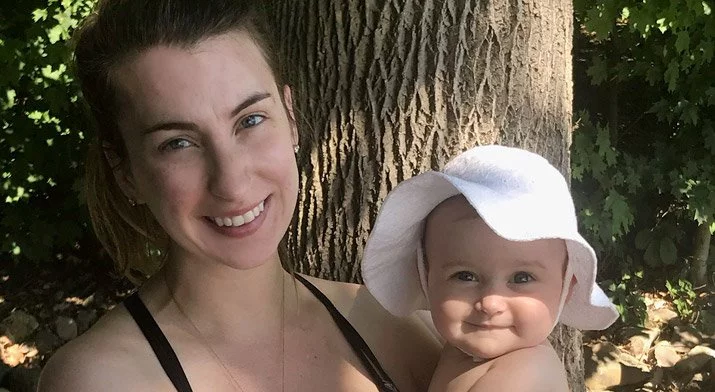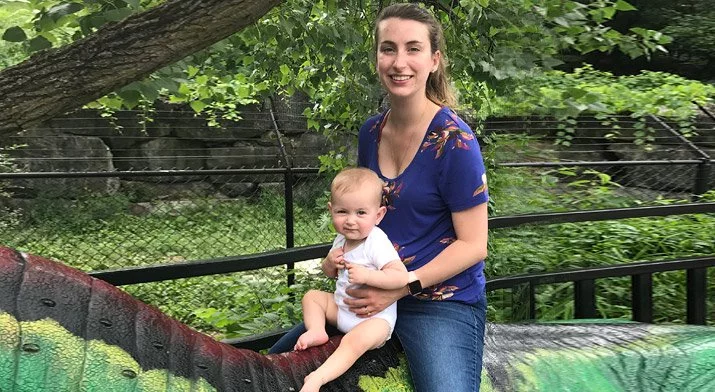My Experience with Perinatal Mood and Anxiety Disorder
By: Emily Smyth, RN
October 11, 2018
Home » Crouse Connects » My Experience with Perinatal Mood and Anxiety Disorder

I had always wanted to become a mother. Since I’d had a miscarriage several years before this pregnancy, it was a huge relief carrying our baby to full term.
Although I was excited and overjoyed, I was terrified to become a mom. I knew that it would be difficult at times, but I felt like I could handle it. I was a registered nurse and used to dealing with stress.
After delivering, I started to fall deeper into a pit of depression and could not understand why this was happening. It started instantly after my daughter was born. In the hospital, I slept just three to four hours total during a 72-hour period, followed by 17 hours of labor. I found myself in a state of panic and anxiety.
My baby had trouble latching to the breast, and she was jaundiced, so we needed to stay in the hospital longer. When we finally returned home, I did sleep, but not well. My mind felt like it was constantly racing. I also felt guilty every time I slept, as if I were a bad mom for being away from my baby for a second.
Sleep deprivation is known to contribute to depression and anxiety, as well as cause memory issues, weakened immunity, high blood pressure, low sex drive and other associated conditions. I knew this, and blamed my feelings on sleep deprivation.

Emily and her daughter, Harper.
Yet I felt as though something must be wrong with me. Here I have this beautiful baby and I loved her, but I had to make such an effort to be happy around her. What kind of mom has to force herself to enjoy time with her baby?
After four months postpartum, I hit rock bottom. Fortunately, my husband was proactive in encouraging me to get help. I’m really not sure if I would have been able to admit to myself that I needed it.
I went to my OB doctor, who told me I’d scored high on a scale that screens for postpartum depression. I didn’t want to take any medication. A few weeks later, I found myself crying while my baby was nursing. I had no idea why I was crying, and felt so stuck in this pit of depression. It’s difficult to describe the feelings, but it was a combination of fear, anger, frustration, despair and failure. I had convinced myself I was not fit to be a mother.
When I finally decided to take medication for postpartum depression and told my family, they were surprised. I had shared my feelings with them, but they didn’t know just how severe this pain was. I was very good at internalizing and hiding my struggles, which is what I felt I needed to do. I told myself it was not normal to feel this way and I felt ashamed.
Taking an antidepressant did not fix everything, and it took a couple weeks until I started feeling better. The assistance of medication helped me start thinking more clearly and rationally. When I wrestled with my emotions, even in a constant state of sadness, I felt I could make it through.

No mother should deal with postpartum depression and anxiety alone, or feel as though they should be dealing with it alone. I’m grateful I found the resources and help that I did. I do feel I missed out on my daughter’s newborn months because I was dealing with the depression. When I began feeling better, I soaked up every minute with her.
We still have some challenging days, but now I feel I can handle those times, and on the good days, I’m able to truly enjoy them. In the end, that’s all that really matters.
Learn more about the You Are Not Alone Family Support Group
Learn more about the Perinatal Family Support Program
Emily Smyth, RN is a registered nurse living and working in Central New York.
Categories: Women's Services
Tags: Maternal Mental Health, Perinatal Mood and Anxiety Disorder
Share this
